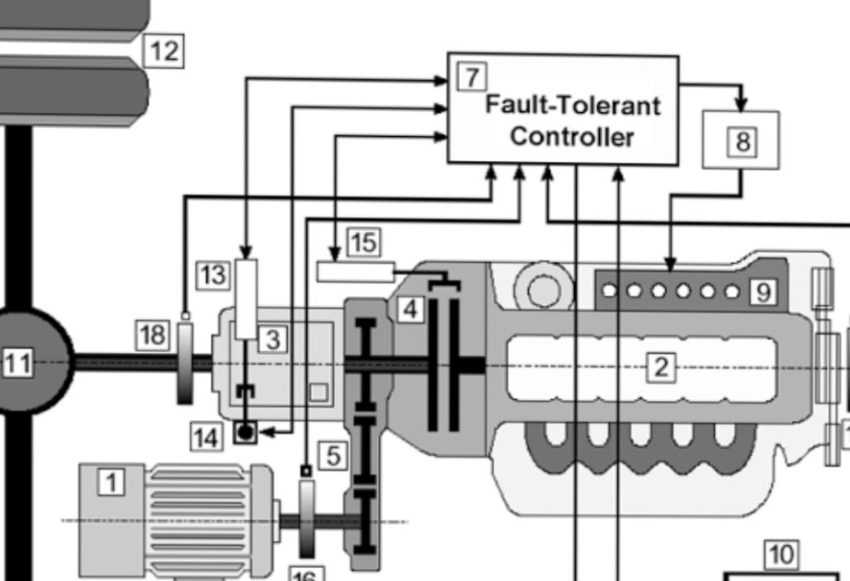Electronic Valve Control (EVC) in hybrid and electric vehicles refers to the use of electronic systems to control the operation of valves in the engine.
When it comes to maximizing system performance, efficiency, and overall vehicle operation, electronic valve control is essential in the world of hybrid and electric vehicles (HEVs and EVs).
In traditional internal combustion engines, valves control the flow of air and fuel into the cylinders and the expulsion of exhaust gases.
Electronic Valve Control In Hybrid And Electric Vehicles
Understanding Electronic Valve Control In Hybrid And Electric Vehicles
In hybrid and electric vehicles, where internal combustion engines are often part of a broader powertrain, electronic valve control can be employed for various purposes
Optimizing Efficiency
EVC systems can adjust valve timing and lift dynamically based on driving conditions to optimize engine efficiency. This is crucial in a hybrid system where the internal combustion engine may operate in different modes.
Reducing Emissions
By precisely controlling valve timing, EVC can contribute to lower emissions by optimizing the combustion process and ensuring that the engine operates at its most efficient point.
Enhancing Performance
Electronic control allows for more precise and rapid adjustments to valve timing, contributing to better overall engine performance, especially in situations where quick response is needed.
Transitioning Between Power Sources
In plug-in hybrid vehicles, electronic valve control can assist in seamlessly transitioning between electric-only and hybrid modes by managing the operation of the internal combustion engine.
Regenerative Braking
Some hybrid and electric vehicles use the internal combustion engine for regenerative braking. EVC can play a role in controlling the valves during this process to maximize energy recovery.
Reducing Noise and Vibration
Electronic control enables more refined management of valve operation, contributing to smoother engine performance and potentially reducing noise and vibration.
Overall, electronic valve control is part of the sophisticated electronic control systems in modern vehicles, allowing for precise optimization of various parameters to achieve better efficiency, performance, and emissions control in the context of hybrid and electric powertrains.
Benefits of Electronic Valve Control In Hybrid And Electric Vehicles
Electronic valves sometimes referred to as electronically controlled valves, or ECVs are essential parts of the battery thermal management system (BTMS), engine cooling system, and air conditioning system that control the flow of fluids.
Electronic valves help to improve fuel economy, lower pollutants, and increase user comfort by accurately controlling fluid flow.
Electronic Valve Control in Air Conditioning Systems
It is very necessary to have air conditioning systems in hybrid and electric vehicles. During different weather conditions, this system is quite helpful in maintaining a comfortable cabin temperature.
Electronic control valves are one of the most important instruments that regulate the refrigerant flow within the air conditioning system. The flow regulator valve system ensures the right cooling performance and energy efficiency.
These valves are designed to receive signals from the vehicle’s electronic control unit (ECU), so that it adjusts the refrigerant flow based on factors such as cabin temperature, compressor speed, and ambient conditions.
Electronic Valve Control in Battery Thermal Management Systems
The battery pack is essential to the storage and provision of electrical energy in HEVs and EVs. However, temperature changes have a big impact on battery performance.
The battery pack’s coolant flow is regulated by the BTMS using electronically controlled valves, which keep the batteries operating within their ideal temperature range. The safety, overall system efficiency, and battery life are all improved by this accurate temperature management.
Electronic Valve Control in Engine Cooling Systems
The internal combustion engine (ICE) continues to be a major source of power in hybrid powertrains.
The engine cooling system regulates the engine’s operating temperature within a predetermined range by the use of electronic flow regulator valves. By carefully controlling the coolant flow via the digital flow control valve, these valves maximize heat rejection and prolong engine life.
Benefits
Electronic valve has different benefits in hybrid and electric vehicles.
They are capable of improving the process efficacy of others in hybrid or electric vehicles. It is necessary to explore these benefits properly:
Enhanced System Efficiency
System efficiency increase with the help of these Liquid flow control. This helps to manage the fluids properly, minimize energy consumption, or improve the overall system permanence.
Improved Comfort and Performance
The electronic flow control valve properly manages the temperature regulation in the air conditioning system or battery thermal management system. This maintains battery performance and improves comfort for users.
Reduced Emissions
Reduced emissions and a more ecologically friendly car are the results of improved air conditioning and engine cooling.
Simplified installation and commissioning
When compared to conventional valve systems, electronic digital flow control valves can be commissioned more rapidly and it is even helpful in minimizing the complications during the installation process.
Adaptive Control Capabilities
Electronic valve control systems have the capability of providing optimal performance and efficiency in a variety of scenarios by adapting to changing driving circumstances and environmental factors.
Precise Temperature Control
By enabling precise and responsive control over refrigerant flow, EXVs guarantee that the air conditioning system and battery run within their ideal temperature ranges.
This exact management extends the life of vital components, minimizes overheating, and improves battery performance.
Conclusion
In hybrid and electric cars, electronic valve control has become an essential technology that allows for more accurate fluid flow management. It is even helpful in increasing system efficiency, increased comfort, and lower emissions.
These are some of the major advantages of using a digital flow control valve. These electronic valves will become more crucial as the automotive sector embraces electrification in order to maximize these vehicles’ sustainability and performance.
Related Update
Things to Avoid When Writing Curriculum Vitae CV
5 Key Managerial Skills Employee Needs to Have in CV
Top 10 Countries to Travel by Sea from Nigeria
History of Nigerian Mass Media Development & Significance
History of Film in Nigeria & Cinema Film Industry in Nigeria
Thanks for staying in touch with us on Electronic Valve Control In Hybrid Vehicle









